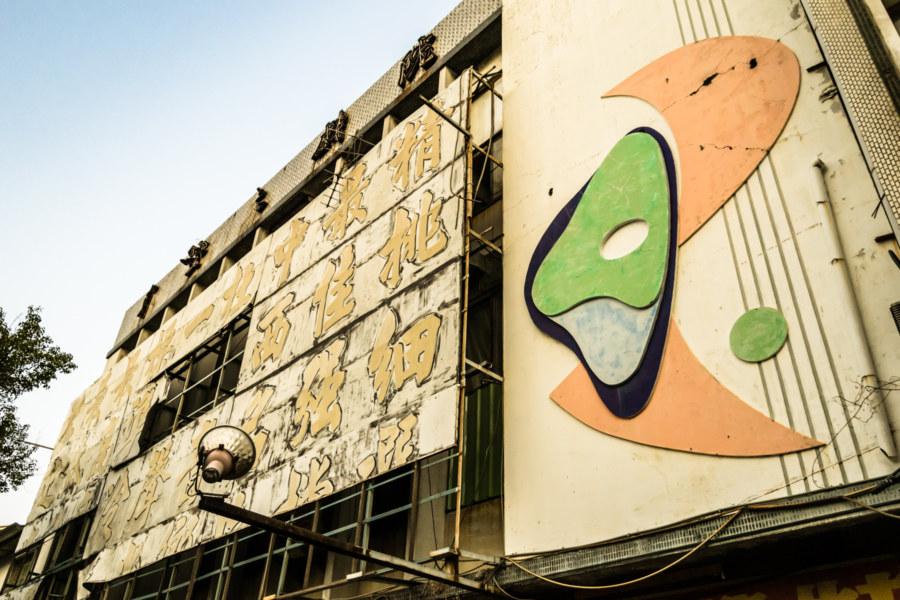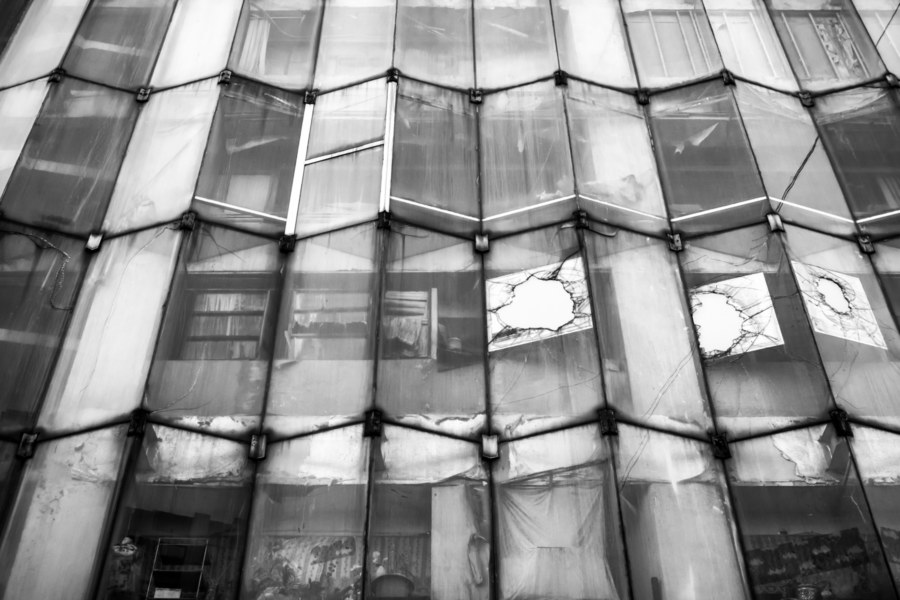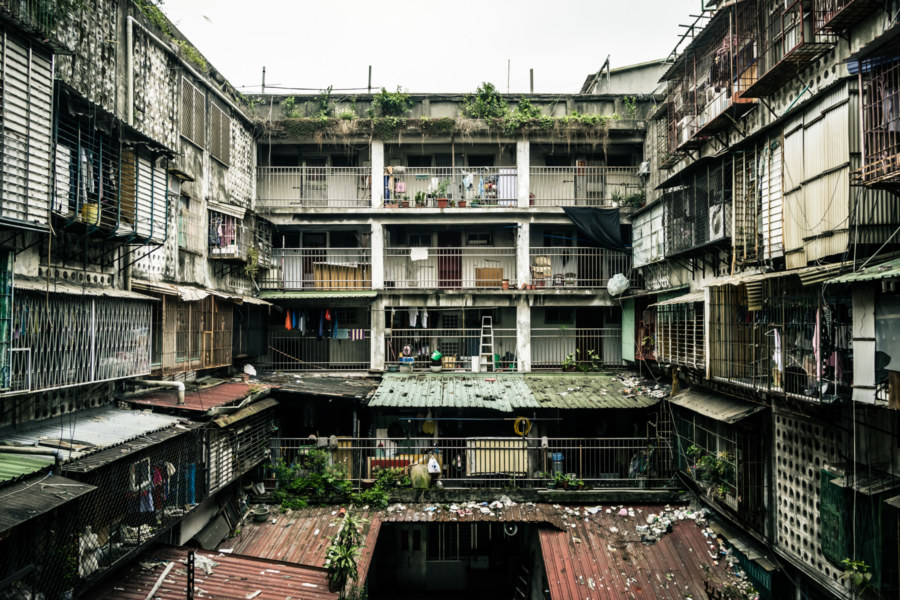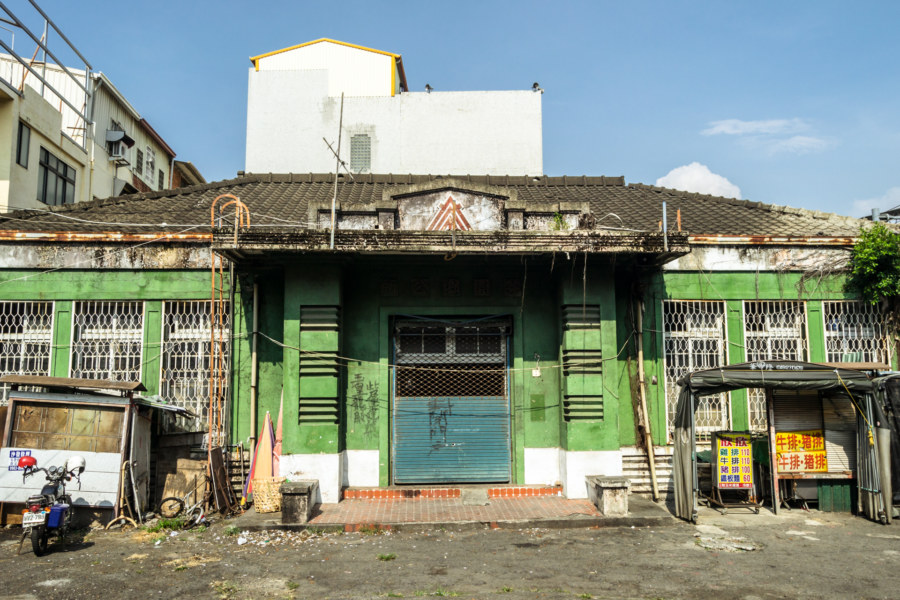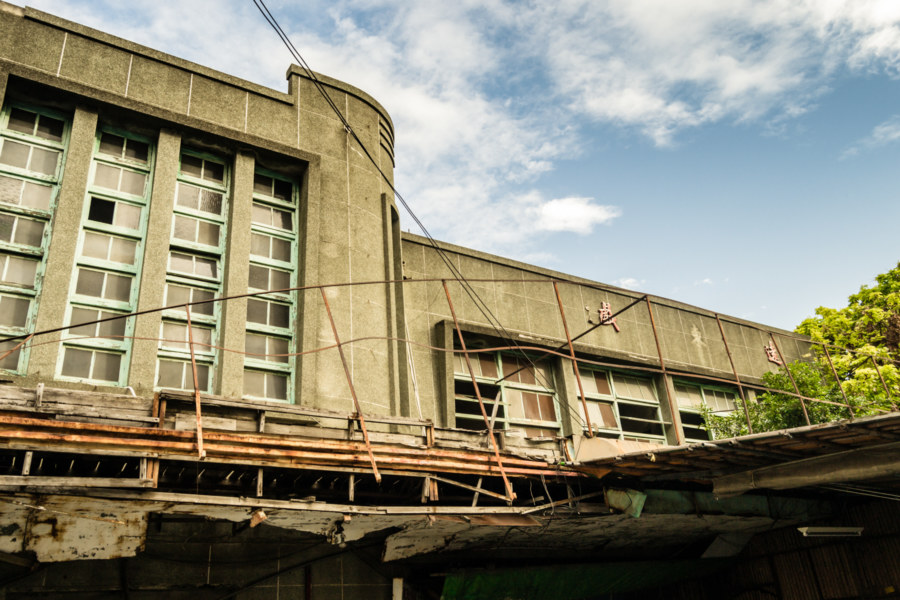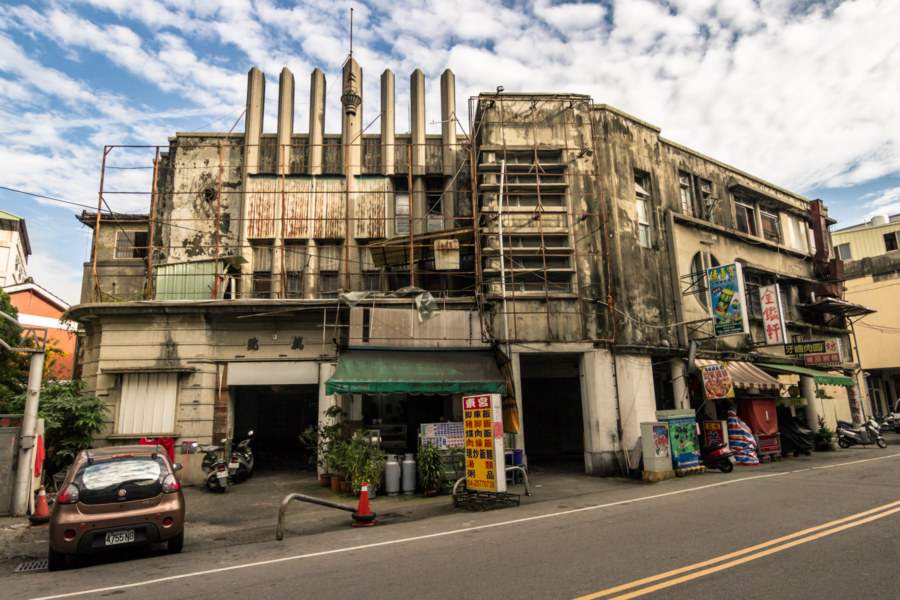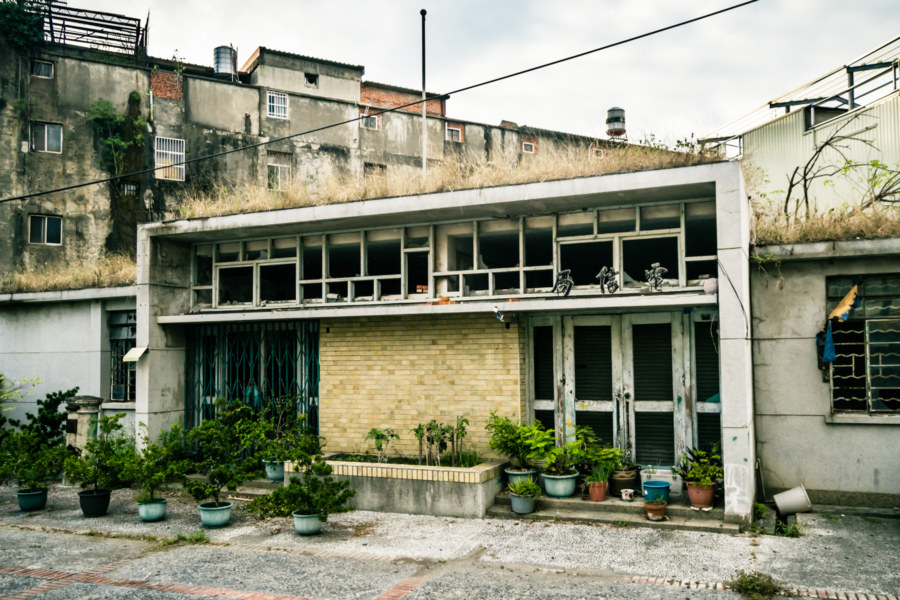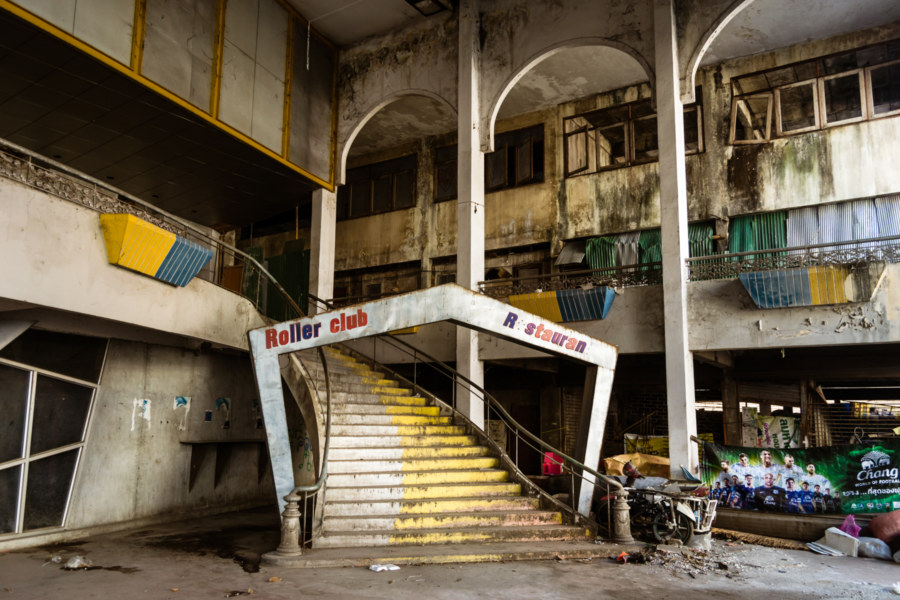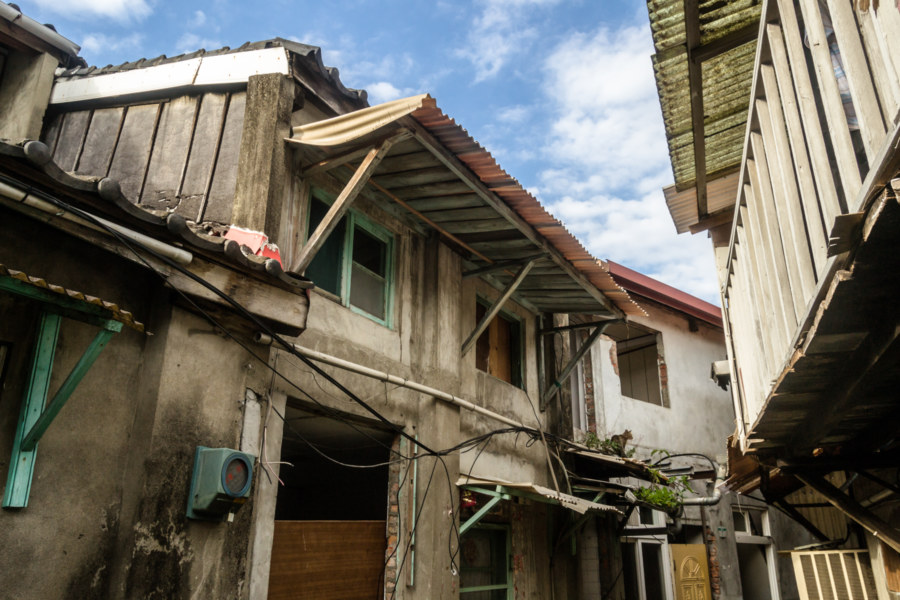Recently I added yet another theater to my growing catalogue of old school cinemas in Taiwan: the derelict Dōng’ān Grand Theater 東安大戲院 in East Tainan. This theater opened in 1969 and closed its doors not long after the turn of the millennium, another victim of changing consumer habits. I wasn’t able to find a way inside this theater so this post only features a handful of exterior shots and some links I chanced upon after conducting preliminary research.
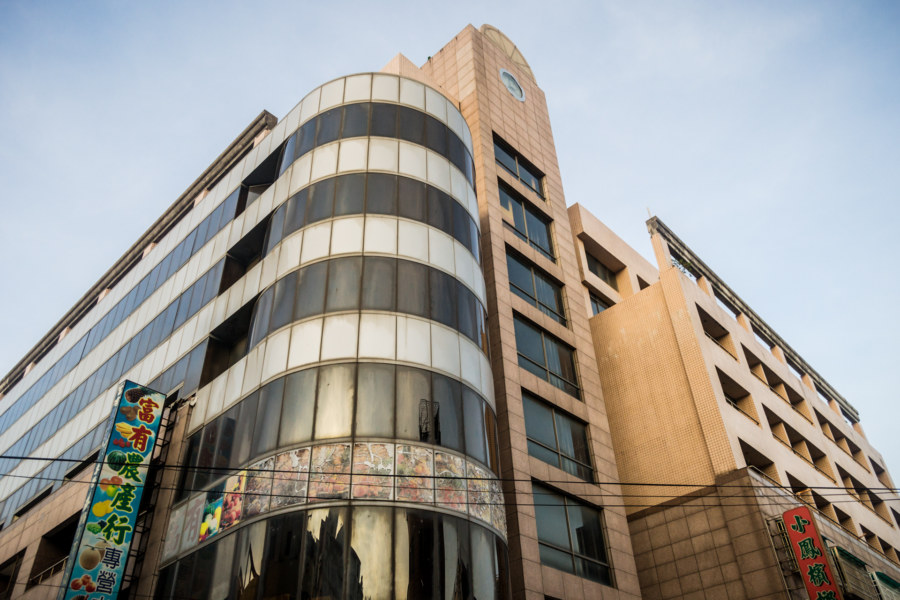
Disused places, as the name implies, are mostly abandoned but still in use somehow. This is fairly common in urban population centers where the upper levels of large buildings may be sealed off while commerce continues on the ground floor. See also: urbex.
Adjacent Terms
Zhongwai Department Store 中外百貨
Today I went to investigate reports of an abandoned building on the edge of Xīméndīng (西門町), a busy commercial district in central Taipei. It is fairly well-known due to its central location but I could find no easy means of entry for the very same reasons. From this television news report it sounds as if this was originally the Zhōngwài Department Store Company (中外百貨公司) and later the Yángyáng Department Store (洋洋百貨). While it isn’t surprising to find such ruins around much of Taiwan it is somewhat unusual to see in such a prosperous area. The building is for rent, as I understand it, and much of the aforementioned report seems concerned with the outrageous price tag for such a decaying monstrosity.
Inside the Decaying Courtyard
The view from within a decaying public housing block in downtown Taipei.
Yesterday I followed a lead to Lánzhōu Public Housing (蘭州國宅), a KMT authoritarian era project in central Datong, Taipei. It is similar to Nanjichang Community (南機場社區), a far more well-known housing project in Wanhua, but this building was constructed almost ten years later in 1973. As with Nanjichang, its fate also remains unclear, as the city is working through complex land ownership issues to figure out how to move residents into more modern housing. I plan to have a full write-up about this place some day so I’ll leave it at that for now—just a glimpse.…
Fenyuan Town Hall 芬園庄役場
Fenyuan Town Hall (芬園庄役場) is another example of neglected Japanese colonial era architecture in Taiwan. Built in 1935, this modest building was the administrative center of the village of Fenyuan, located on the eastern edge of Changhua back when it was part of Taichū Prefecture (臺中州). It survived the war and remained in use until 1994 when a newer town hall was built down the street. Art Deco flourishes and the rust-colored emblem over the entrance give Fenyuan’s old town hall a distinctive look. Nowadays it is derelict—but it seems likely that it will be restored and opened to the public some day.
Beidou Yuandong Theater 北斗遠東戲院
Beidou is home to the historic Yuǎndōng Theater (遠東戲院, literally “Far East Theater”), originally built in 1955. Like most vintage theaters in Taiwan it struggled through the home video era and eventually shut down in the late 1990s. Unlike many other cinemas of its generation it does not appear to have been subdivided into smaller theaters prior to going out of business. It was, however, converted for use as a karaoke bar or gambling den at some point, judging by what I observed on a recent visit. As of 2015 the interior is used for nothing more than storage, particularly for a restaurant that has since colonized the area adjacent to the former ticket booth and entrance.
Donggong Theater 東宮戲院
Dōnggōng Theater 東宮戲院 is located in Dongshi, a Hakka majority township in mountainous central Taichung. Dongshi (or Tungshih in the older Wade–Giles Romanization system) is the gateway to the densely forested interior and was a major center of the lumber industry in Taiwan prior to its decline in the late 1970s and early 1980s. Disaster struck in 1999 with the devastating 921 Earthquake. Dongshi was among the worst hit; over 300 people lost their lives and hundreds of buildings collapsed—but not this grand old theater.
Xizhou Telecom Bureau 溪州原電信局
This week I visited the small town of Xizhou in southern Changhua to locate the eponymous Xizhou Theater. I found no way into the theater but made a serendipitous discovery while walking around the block in search of another access point. Across the street I noticed the utilitarian outline of the former Xizhou Telecom Bureau (溪州原電信局), a modest building that once housed a combined post office and service counter for the state phone company, then known as the [Directorate General of Telecommunications (交通部電信總局). The sign above the entrance simply reads Diànxìnjú (電信局), or “telecommunications bureau”, which is all anyone needed to know in those days. Taiwan’s telecom monopoly was broken up in 1996 with the privatization of what became known as Chunghwa Telecom (中華電信). In the absence of any sort of historic information about this obscure abandoned office I’d guess it was built sometime in the late 1970s or early 1980s.
Space Roller, Chiang Mai
Space Roller is an abandoned rollerskating rink not far from the Arcade Bus Station on the northeastern outskirts of Chiang Mai, Thailand. I dropped in to check it out in January 2016 after reading about it online, possibly here, and was impressed with the scale of the place. It is big, taking up the better part of a city block, with several unfinished add-ons extending into the urban wilderness on either side. Unfortunately there isn’t a lot of credible information about Space Roller in English so this post will consist primarily of photos of what I found in about half an hour of slinking through the shadows.
Fushui Village 富水里
Fùshuǐ Village (富水里) is located on a small parcel of land at the southern edge of Zhongzheng, Taipei, just to the west of Gōnggǔan Station (公館站). Technically the village contains the now-abandoned Jiahe New Village (嘉禾新村), a military dependents’ village previously profiled on this blog, but most common uses of the name refer to the illegal settlement running along Yǒngchūn Street (永春街), just inside the riverside wall. This settlement of around a hundred homes, like nearby Treasure Hill (寶藏巖), was supposed to be destroyed around the turn of the millennium, but plans have gone awry, and its fate remains unclear.
Yonghe Theater 永和大戲院
Yonghe Theater 永和大戲院 is one of dozens of derelict movie theaters in Greater Taipei. Like hundreds of other theaters all around Taiwan this one went out of business in the early years of the new millennium due to changing consumer habits, a topic already discussed at length in previous explorations of places like Datong Theater 大同戲院 in Taitung City and Xinming Theater 新明戲院 in Zhongli. Whereas theaters in the rest of the country are often left to the elements, sky-high property values in the Taipei area strongly incentivize owners to do something with these decaying buildings. In this instance the front of the old theater was been converted for the use of into a 7-Eleven convenience store and an Italian restaurant by the name of Lan De Pasta House 嵐迪義大利麵. I wonder whether patrons of these establishments realize what looms overhead?
